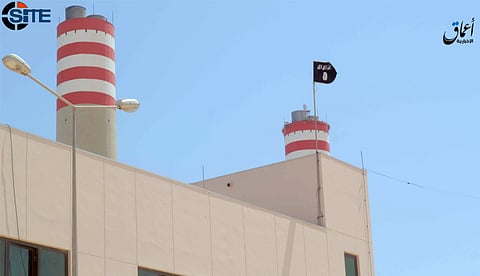Al Qaida attack Daesh after leader killed in Libya
Libya elected parliament delegates in Berlin to discuss UN unity government proposal

Benghazi: Al Qaida-linked militants in eastern Libya declared a holy war on a local Daesh affiliate Wednesday after one of their senior leaders was shot dead by masked gunmen, setting off clashes between the rival militant groups that left 11 people dead on both sides.
The clashes erupted after gunmen opened fire on Nasr Akr, an Al Qaida-inspired militant once jailed in the UK on terrorism charges. The 55-year-old veteran militant, who fought in Afghanistan, was killed along with his aide.
Akr’s group, known as the Shura Council of Darna’s Militants, announced his killing in a statement on Wednesday, blaming it on Daesh terrorists. It accused Daesh of “tyranny and criminality,” and vowed to wage “holy war against them until none of them are left.” It also called on residents to rise up against the extremist group.
The ensuing clashes killed at least nine Daesh terrorists and two from the Shura Council, including Salem Derbi, the commander of the so-called Abu Salem Brigade, which has history of enmity with Daesh.
Daesh began as an Al Qaida affiliate but had a bitter falling out with the global militant network in 2014. The two groups have also clashed in Syria.
An Daesh affiliate seized control of Darna last year after veteran militants returning from Iraq and Syria united the city’s fractured extremist factions and killed off rivals.
Derbi belongs to a generation of Islamist militants who turned Darna into a militant stronghold in the 1980s and 1990s during an insurgency against longtime dictator Muammar Gaddafi. Darna was the main source of Libyan militants and suicide bombers who joined the insurgency in Iraq after the US-led invasion in 2003. Entire brigades of Darna natives fight in Syria’s civil war.
Despite his militant past, Derbi and his followers once secured a visit to the city by Libya’s elected leaders, signifying support for a democratic government, albeit one that would enforce Islamic law.
Meanwhile, a delegation of Libya’s elected parliament has arrived in Germany to discuss with European and North African officials a UN proposal to form a unity government despite some lawmakers rejecting the plan, officials said on Tuesday.
The splits underscored the complex task the United Nations faces in implementing any agreement for a united national authority and a peace deal on the ground where two rival governments and various armed factions battle for control.
On Monday, UN special envoy Bernardino Leon presented a fourth proposal for a peace plan and unity cabinet after months of talks in Morocco, which both sides were expected to discuss with European and North African officials in Germany.
“We are in Berlin,” Emhemed Shoaib, a deputy speaker, told Reuters. UN spokesman Samir Ghattas confirmed the delegation was in Germany as part of the talks.
But four lawmakers, speaking from eastern Libya where the elected assembly is based, said the assembly had rejected the proposal and withdrawn its delegates from the talks.
Some 55 out of 72 attending lawmakers had ordered the delegation to come back to Libya and not to travel to Germany, said Tarek Al Jouroushi, head of parliament’s defence committee.
Three other deputies confirmed this to Reuters while the official spokesman Farraj Hashem could not be reached for comment.
But first deputy speaker Emhemed Shoaib said this was not true, warning in a statement sent to Reuters with the help of a UN spokesman of “burning the issues without reasons.” The UN proposal had many positive aspects but needed further “clarification” to address some points which needed to be reviewed, Shoaib’s statement said, without elaborating.
The UN proposal calls for a year-long government of national accord, where a council of ministers headed by a prime minister with two deputies will have executive authority.
Al Jouroushi said lawmakers objected to including the Tripoli parliament in the proposal. “The proposal does not reflect the legitimacy of the elected parliament,” he said.
The House of Representatives will be the only legislative body, the deal states. The accord also calls for a 120-member State Council consultative body, consisting of members of the Tripoli parliament.
Both sides in the conflict are divided between more moderate forces and hardliners who favour a military solution.
Al Jouroushi is the son of the eastern government’s air force commander, whose force has been battling Islamists in Benghazi.
In the central city of Sirte, Daesh seized a power plant on the western outskirts, killing three members of a force sent from Tripoli to protect the plant, a military source said.
The militants had already seized the city and its airport.
Sign up for the Daily Briefing
Get the latest news and updates straight to your inbox


